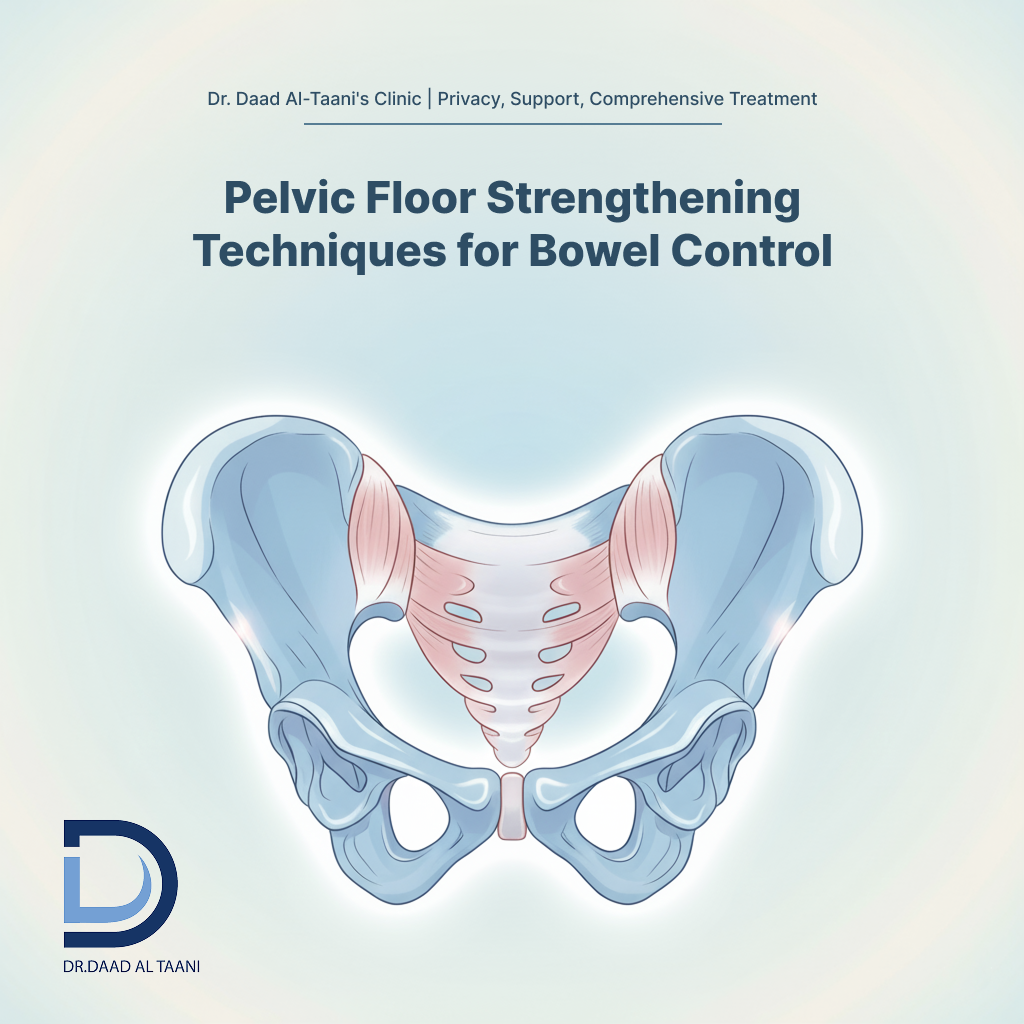Weak pelvic floor muscles are one of the most common causes of bowel control problems, whether gas or stool leakage. This issue can significantly affect quality of life and cause social embarrassment, especially for women after childbirth or with aging. In this article from Dr. Daad Al-Taani Clinic, we highlight the role of pelvic floor muscles in anal control and present the best safe and practical methods to strengthen them.

Pelvic Floor Strengthening Techniques for Bowel Control
Why Are Pelvic Floor Muscles Important for Control?
Pelvic floor muscles act as a supportive network for the lower organs (bladder, uterus, rectum). When these muscles weaken:
- The ability to firmly close the anus decreases.
- The risk of stool or gas leakage increases.
- Other functions, such as urinary control, may also be affected.

Key Techniques to Strengthen Pelvic Floor Muscles
1. Kegel Exercises:
- The most famous and simple exercise to tighten and strengthen pelvic floor muscles.
- Performed by contracting the muscles as if stopping the flow of urine, then relaxing.
- Repeat 10 times × 3 sets daily.
- Over time, this strengthens anal muscles and improves control.
2. Deep Breathing with Pelvic Contraction:
- During inhalation, take a deep breath, then exhale while gently tightening the pelvic muscles.
- Helps coordinate breathing with muscle activation, improving control.
3. Squats and Bridge Exercises:
- Squat: contracting pelvic muscles naturally while lowering and rising.
- Bridge: lying on the back, lifting the hips upward while engaging pelvic muscles.
- Strengthens both pelvic floor and lower back.
4. Biofeedback Therapy:
- Performed in the clinic using special devices.
- Provides visual or auditory signals to help patients learn how to activate pelvic muscles correctly.
- Highly effective for fecal incontinence related to nerve or muscle weakness.
5. Electrical Stimulation:
- Gentle clinical sessions using electrical impulses to stimulate pelvic floor muscles.
- Enhances muscle strength and responsiveness.
Additional Tips Alongside Exercises
- Maintain a healthy weight to reduce pelvic pressure.
- Prevent chronic constipation by drinking water and eating fiber-rich foods.
- Quit smoking as it weakens tissue.
- Engage in regular physical activity such as walking or yoga.
How We Support You at Dr. Daad Al-Taani Clinic
- Comprehensive evaluation of pelvic floor strength with advanced tools.
- Personalized treatment plan including exercises, physiotherapy, or medical interventions.
- Close follow-up to monitor progress and prevent relapse.
- Private women’s care with sensitivity and psychological support.
Conclusion
Strengthening pelvic floor muscles is not just exercise—it is both prevention and treatment. With correct practice and professional guidance, you can regain bowel control and enjoy a comfortable, embarrassment-free daily life.
At Dr. Daad Al-Taani Clinic, we provide modern physiotherapy programs and integrated support to help you strengthen your pelvic floor muscles and restore your confidence.







